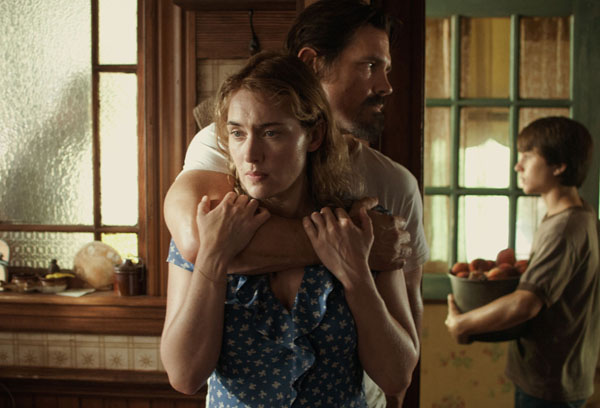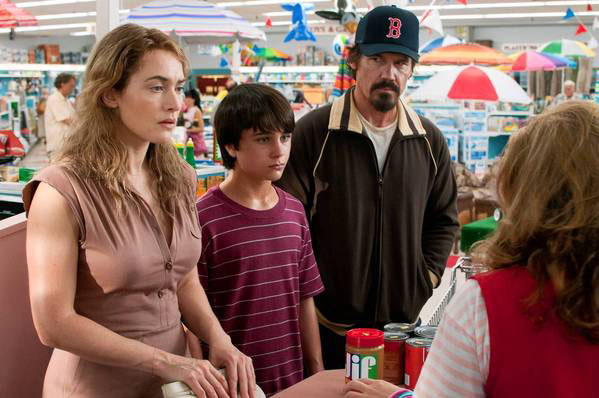“Each year, the Patrons’ Screening, as it’s named, kicks off the Telluride Film Festival,” begins Marlow Stern at the Daily Beast. “Two years ago, the Patrons’ Screening was Alexander Payne’s The Descendants; last year, it was Argo—which would go on to win the Best Picture Oscar. It’s a prestigious slot, to say the least. Festivalgoers must take a gondola up—and then down—a picturesque mountain range to reach the Chuck Jones Cinema, where said screening takes place. And this screening was a hot ticket. Francis Ford Coppola sat a stone’s throw from me, as did Oscar-winning filmmaker Asghar Farhadi (A Separation), and Michael Moore. The film we all came to see is, it turns out, Jason Reitman’s Labor Day, which won’t hit theaters ’til Dec. 25. It’s Reitman’s third film to make its world premiere at Telluride, after hits Juno and Up in the Air, and marks a creative deviation of sorts into darker territory.”
“Jason Reitman’s initial four features each contained a distinctly cynical edge, mainly due to their bitter, cantankerous anti-heroes who had witticisms to spare,” writes Indiewire‘s Eric Kohn. “Labor Day, his fifth and most fluid work, contains no such ironic refrains. A significant departure for the director, Labor Day is a classical, melodramatic tearjerker that’s also a sincere coming-of-age story.”
“Subtract the kidnapping,” suggests Variety‘s Peter Debruge, “and Labor Day depicts the most romantic long weekend a divorced hausfrau could hope for, as a swarthy stranger waltzes into her life, passing the time by fixing her car, making pie and teaching her awkward son to play baseball. Factor in the notion that the outsider is an escaped killer, however, and this all-summer-in-a-day story starts to feel as baked as the convict’s peach pies.”
“Kate Winslet goes for even greater heights of post-Mildred Pierce mousiness—mostly successfully—as a divorced housewife who’s developed such post-split jitters that she can’t even consider leaving the house without a close-up of her shaking hands,” writes Chris Willman, who gives Labor Day a C at the Playlist. “Her first venture out for groceries in a month goes even worse than she imagines it might, when her teenaged son Henry introduces her to the bleeding escaped convict who’s about to kidnap them. Fortunately, said escapee looks like Josh Brolin, and he plans on taking them home, which works out well for an agoraphobic.”
“Set in 1987 New Hampshire, the movie is an adaption of Joyce Maynard’s novel of the same name and is primarily told through the eyes of Henry, Adele’s 13-year-old son (Gattlin Griffith),” explains Gregory Ellwood at HitFix, where he notes that the film is narrated by Tobey Maguire as an older Henry.
“I’d say it’s a romantic drama that harkens back to the great tradition of Hollywood tearjerkers,” writes Pete Hammond for Deadline, “and reminded me of a combination of The Bridges of Madison County, Shane, and a 1940s style melodrama that might have starred Robert Mitchum and Jennifer Jones.”
“The work I was most reminded of was Clint Eastwood’s from the early-90s,” offers In Contention‘s Kristopher Tapley. “Indeed, Labor Day… feels like it was baked in the same oven as A Perfect World or The Bridges of Madison County.”
“As understandable as it will be to compare Labor Day to similar coming-of-age-with-crooks yarns Mud and A Perfect World,” writes William Goss at Film.com, “Reitman’s decidedly mature work here on both page and screen also evokes the remove of Todd Field, although maybe seeing a suburban Kate Winslet struggling to attain happiness (as in Field’s Little Children or in Revolutionary Road) adds an echo all its own. Only the epilogue feels like a prolonged surrender to more maudlin tendencies, an irony that may leave one wanting Labor Day to end sooner than its own characters do.”
“Before the screening,” notes Anne Thompson, “Reitman described his adaptation as the closest he’ll ever do, and thanked Maynard, who took a bow, for being his collaborator—and teaching him how to make a pie. The movie played to strong applause. I’d like to think that these movie-loving adults will spread the word that audiences around the country should let the studios know that it’s ok to make these movies. Still.”
Having premiered at Telluride, Labor Day will be a Special Presentation in Toronto.
Updates, 9/1: “It’s clear virtually from his entrance that this is the best film role Brolin has had since No Country for Old Men and maybe ever, and he makes the most of it,” writes Todd McCarthy in the Hollywood Reporter. And “Winslet outstandingly reveals the numerous ways Adele is pulled emotionally by the sudden eventfulness of her life after all these years.”
Labor Day “is both Reitman’s most traditional and personal film,” argues John Horn in the Los Angeles Times. “Its camera moves, editing and scoring are decidedly old-fashioned, and unlike Reitman’s other films, its lead characters don’t hide behind glib dialogue or sometimes operate like preternatural versions of real people—as did Ellen Page in Juno or George Clooney in Up in the Air. Adele, Henry and Josh feel much more authentic, but they share a common Reitman denominator: lost souls looking for a meaningful connection.”
Updates, 9/8: Frank is “an insta-father immediately better than Henry’s real one (Clark Gregg),” notes the Guardian‘s Catherine Shoard. “He is kind and caring to a local disabled boy, who nearly heals beneath his loving touch. ‘I came to save you, Adele,’ he says at one point. This is Christ with a spatula, ironing topless. In fact, Labor Day is not entirely religious allegory. It is fairytale, whose Oedipal issues and creeping ritualism would make a revealing double bill with Nicolas Winding Refn’s Only God Forgives, another freighted take on a mother/son relationship whose dysfunction is partly resolved by violent intervention.”
“Reitman’s fifth feature builds on the promise of his earlier work, showing him more confidently delving into ambiguous character studies and nuanced emotional terrain,” writes Tim Grierson for Screen Daily.
“There’s craft, care and sensitivity in every frame of Labor Day, so why does the movie feel so counterfeit?” asks the Telegraph‘s Tim Robey. Reitman “lapses… into a sun-kissed emotional monotone, and more or less sets up camp. Dreamy sincerity is the effect he’s going for, but there are only so many baseball games in magic-hour light, trailer-ready montages of cozy household ritual, and fragmentary flashbacks of one character’s mysterious past a movie can peddle before you start to wonder if it’s for real.”
But for Tina Hassannia, writing at the House Next Door, “Reitman’s strength here lies in his imagery, with a focus on close-ups and sensual details, and the effect is a bit Malickian.”
“I’m all for sincerity in filmmaking, but the quality that has defined Reitman’s best movies—Up in the Air, Juno, and Thank You For Smoking—is audacity, and he really needs to get that back,” writes EW‘s Owen Gleiberman.
Update, 9/9: “Brolin very nearly sells his impossible character as a misunderstood man trying desperately to be decent,” writes Norm Wilner for Now Toronto, “and Griffith is appropriately hesitant and watchful. But Winslet settles for another of the mannered, Important Actor performances she’s been giving in movies like The Reader and Revolutionary Road, and Reitman doesn’t do anything to snap her out of it.”
Updates, 9/11: For Ben Kenigsberg, writing at the AV Club, watching Labor Day “suggests the experience of being pelted with a thousand supermarket paperbacks at once. Veering away from the prickly tonal complexity of Young Adult—a female Greenberg centered on a courageously off-putting Charlize Theron performance—Reitman has taken a stab at bald-faced melodrama, trolling viewers with an almost comical onslaught of clichés.”
Nigel M. Smith interviews Brolin for Indiewire.
Updates, 9/12: “Too much sugar ruins the pie!” warns Jay Kuehner in Cinema Scope. “Jason Reitman’s shamelessly saccharine adaptation of Joyce Maynard’s novel could not have resisted such a bromide, as it was baked into the dough.”
“Reitman seems taken with the florid pretensions of Maynard’s story, particularly her coming-of-age framing,” writes Wesley Morris at Grantland. “Yes, even with strategically dispersed flashbacks, we never know exactly what’s going on with Winslet and Brolin because most of the film is told from the point of view of a seventh-grader, which, I’m sad to report, is just about the emotional level of this movie. You know how satires of award shows have fake clips of actors performing earnest-looking nonsense (like a mom and son baking a pie with an escaped convict)? That’s Labor Day: a movie so blandly absurd it could only be a joke on bland absurdity.”
Updates, 9/14: Labor Day is a home-invasion thriller transformed into a romantic bondage fantasy,” writes Time‘s Richard Corliss. “You will meet a tall dark stranger. He will tie you up and feed you chili, blowing on it before slipping the fork into your mouth. If your response to that gesture is a concupiscent ‘Aaahhh!’ and not a repulsed ‘Ewwww!,’ you will know you’ve met that special someone in this, your very special movie.”
At the Dissolve, Noel Murray is disappointed to discover that “Reitman means to treat this material as hushed, heartfelt drama, not as the ludicrously over-amped melodrama that the plot suggests.”
Update, 12/25: “Labor Day excels by never letting one of its three protagonists take precedent over another,” writes R. Kurt Osenlund in Slant. “In Henry, Adele, and Frank, it presents a kind of unconventional love triangle, marked by hormonal awakening, romantic rebirth, masculine influence, and the fulfilling of common familial needs. Some of this works.”
Update, 12/26: “Labor Day is likely to get ignored in the crush of December and presumed stinky in the graveyard of January,” writes Jason Bailey at Flavorwire. “Both sentences are a shame, since it’s a risky and genuinely unusual piece of work. This is not to say it’s a great film—it’s not…. Yet in spite of its many problems, Labor Day doesn’t deserve to be dismissed. Its sense of time and place (1987, New Hampshire) is right on the money, and Eric Steelberg’s autumnal photography is ridiculously handsome, his light bouncing appropriately off every half-heartedly oscillating fan. Brolin has the easy, unforced menace thing down cold; watch the way he lays his hands on the kid, puts his arm around him, saying nothing and everything at once. Winslet puts across her crippling sense of closed-off fright early on, and bangs that drum loud enough that it resonates for the rest of the picture.”
Update, 1/7: Anthony Lane in the New Yorker: “Labor Day is hardly novel in proposing an overlap between the criminal and the carnal; that common ground was prowled long ago, by the scandalous ardors of film noir. What is unusual about Reitman’s movie is that it takes a bad boy and drains the badness out of him before he has a chance to do anything bad. Early on, we learn that Frank is a convicted murderer, but, as he argues, ‘I’ve never intentionally hurt anyone in my life,’ a claim borne out by a series of lumbering flashbacks. You have to feel sorry for Brolin. Here was his chance to play hot and nasty, instead of which he ends up presenting a do-it-yourself domestic dream: how to build a family in a weekend.”
2013 Indexes: Telluride and Toronto. For news and tips throughout the day every day, follow @KeyframeDaily on Twitter and/or the RSS feed. Get Keyframe Daily in your inbox by signing in at fandor.com/daily.





